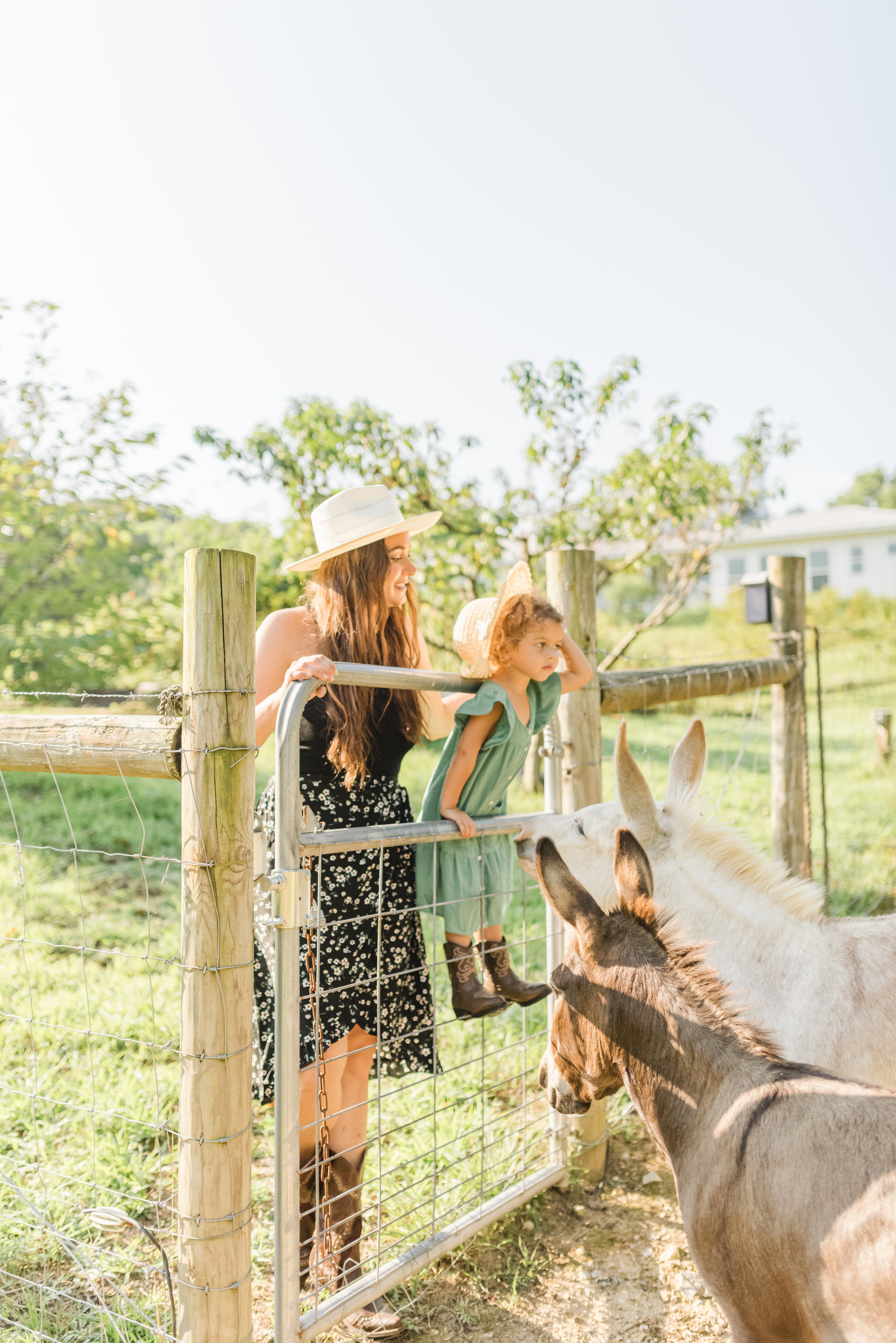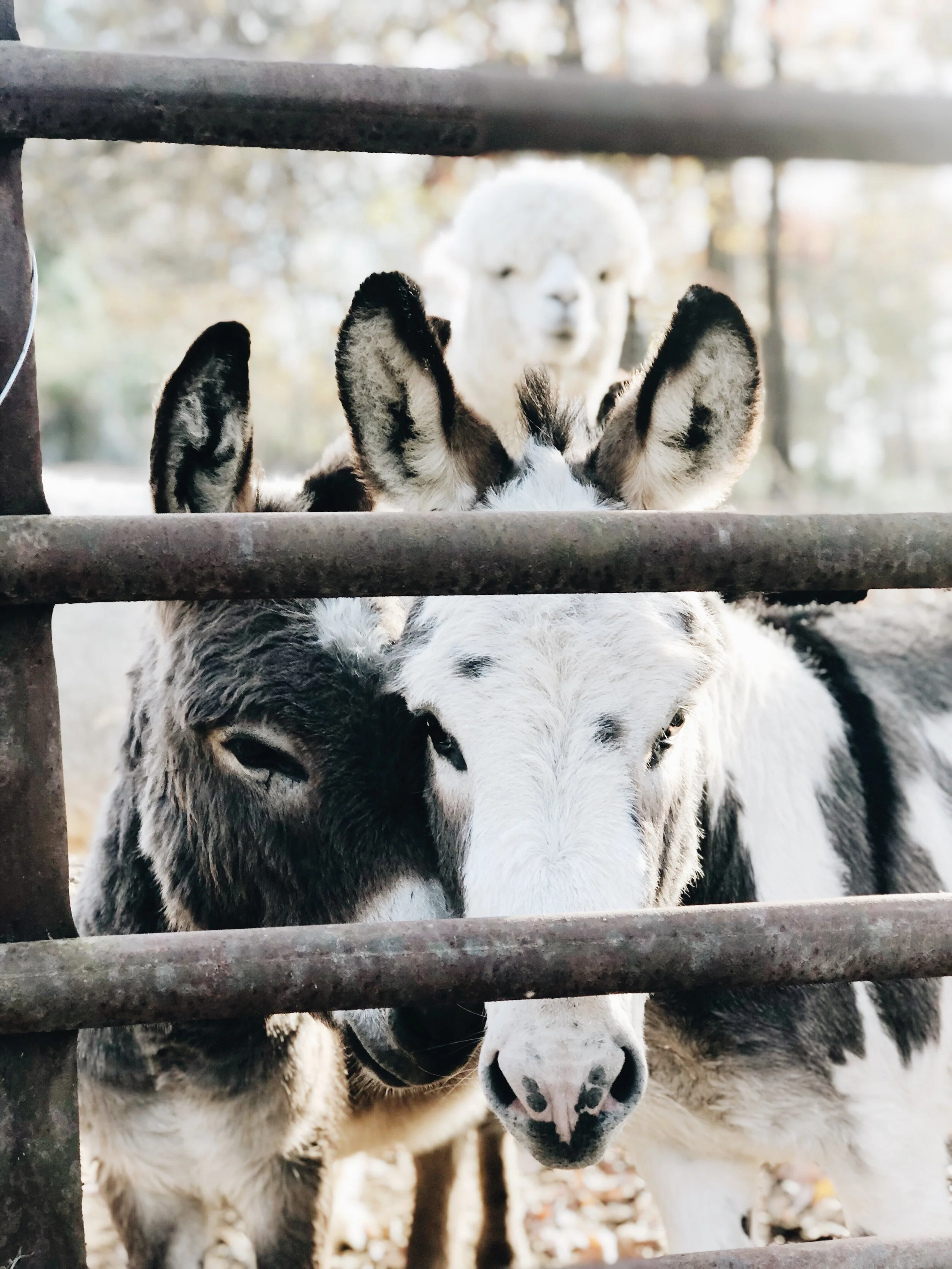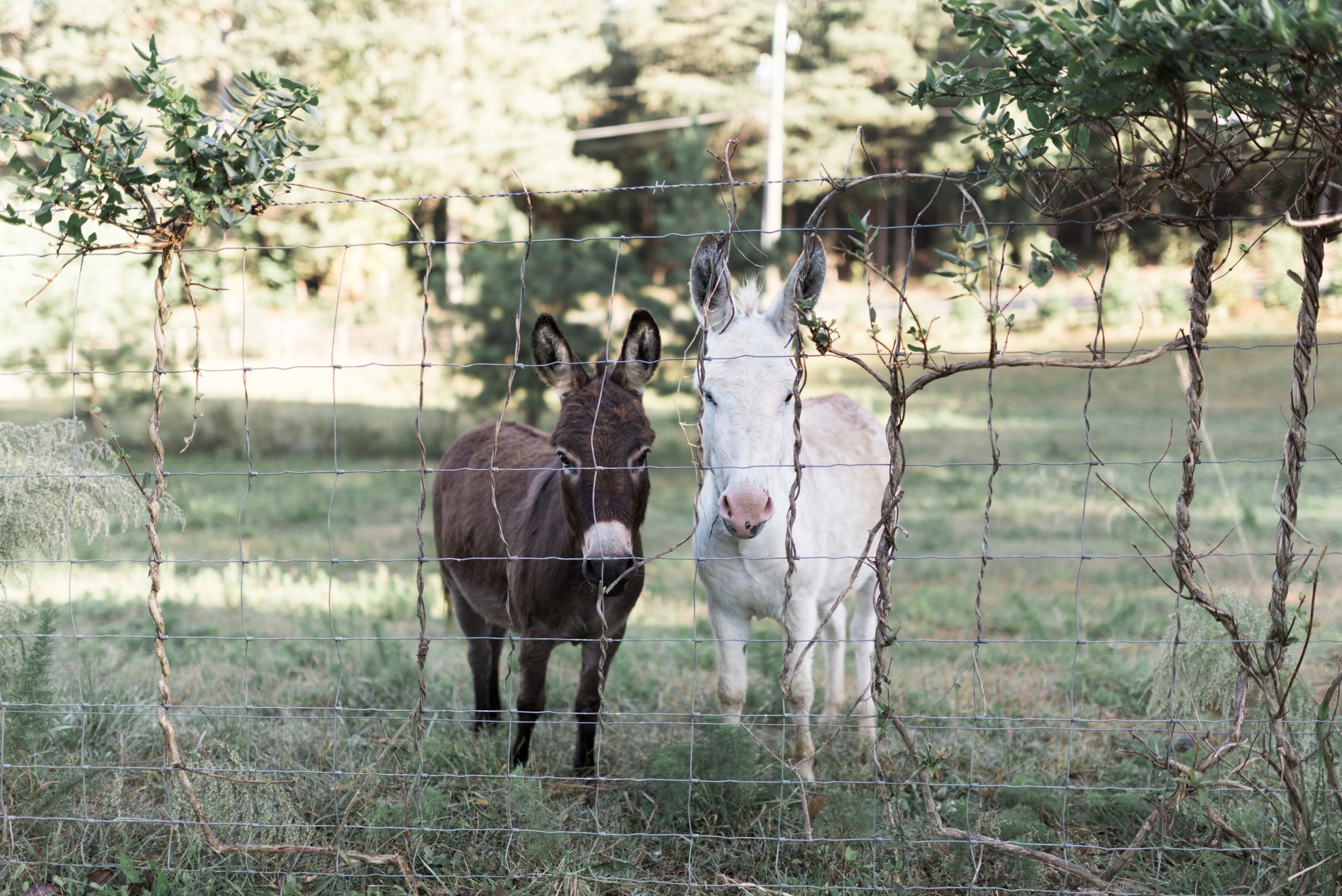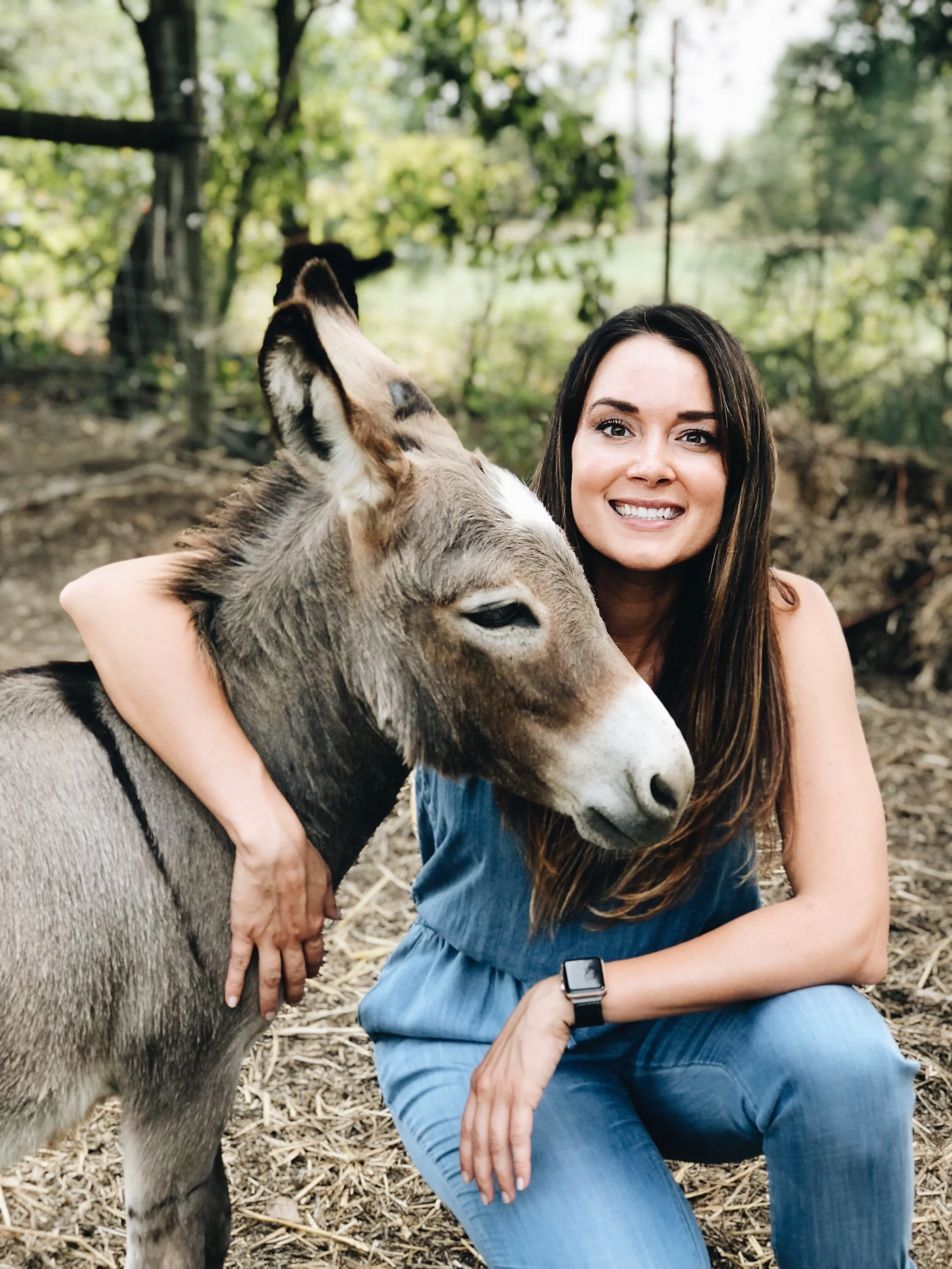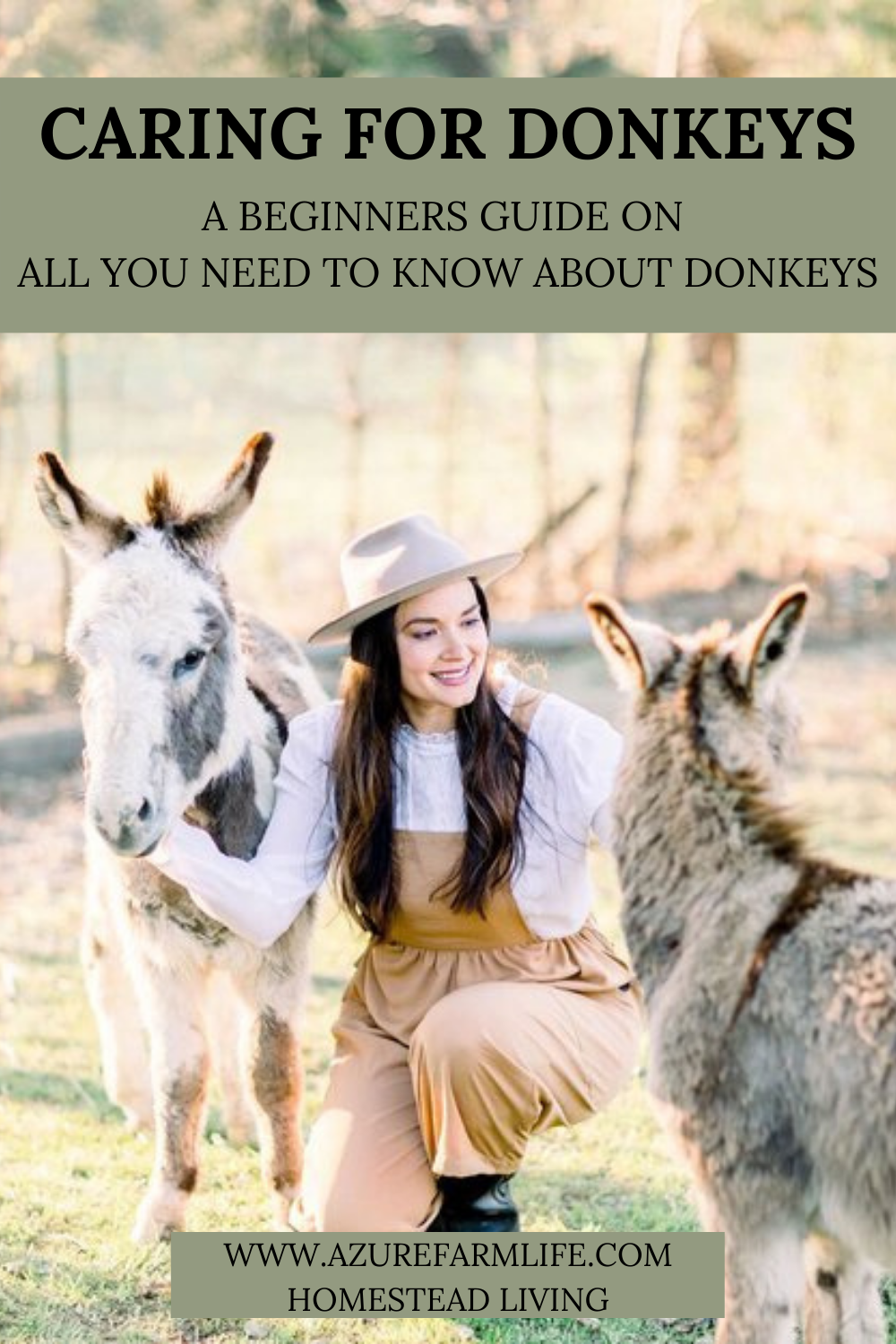A beginners guide to caring for donkeys - all you need to know
Having our donkeys has been such a fun part of our homesteading journey!
Are you debating getting one? Or perhaps it has been decided, and you now need to learn all you can about how to care for donkeys. Well, then, you are in the right place!
Here are a few thoughts I have learned over the past 6 years of having them on the farm. Along with all the details you need to know about caring for donkeys. I hope it’s helpful and guides you in having your own!
Please note that I am not a veterinarian. Research diligently before making decisions for your donkeys. Always speak with a trusted vet when possible. These are all my thoughts based on the experience and knowledge we have gained over the last few years.
WHY DID WE GET DONKEYS?
Well, the honest first answer is because they are so cute! We had heard they would possibly help protect the flock, so we figured it would be fun to get one. At first, we looked for a regular-sized donkey, but I was hooked when I saw a miniature baby.
We got Buddy back in December of 2017 when he was about 6 months old. Then, in February of 2018, we added Chilli, and later on, Blossom and Honey joined the crew in the summer of 2020. And very recently, we welcomed Fergus and Fiona. So that’s a total of 6 very loveable donkeys!
I must say they have been our easiest animals and have brought much love and laughter to our farm. Hearing them hee-haw is so fun, and they definitely know when we are coming to give them treats. They are like big dogs, and I just love them so much.
DONKEY FACTS
1.) They are by nature, very loving and affectionate
2.) They are known to live 25+ years if cared for well.
3.) Males are called Jacks, and females are called Jennets. Castrated males are called geldings. (It's usually recommended you keep 2 Jennies or a gelding and a Jennie.
4.) Most donkeys will have a cross on their back. The cross is a darker brown or black dorsal stripe running from the top of the donkey's back and across the shoulders. Both our donkeys have this cross.
There is a legend called the "Legend of the Donkey's Cross." It states that Jesus rewarded the donkey for his loyalty to Him when he carried Jesus into Jerusalem and stayed with Him at the crucifixion. By placing the shadow of the cross across the donkey's back for all to remember the importance of God's humblest of creatures.
5.) Donkeys are very strong, sometimes even stronger than a horse.
6.) They have incredible memories and can remember you even if they have not seen you for a long time.
7.) Donkeys don't like being kept on their own, although a single donkey will live quite happily with goats. ( More on this topic a bit lower in this blog post).
8.) Donkeys are used as guard animals for cattle, sheep, and goats since they have a natural aversion to canines and will keep them away from a flock. ( However, since miniature donkeys are smaller, they don't offer the same protection. So keep this in mind when getting them if you want them for protection) They can help protect against a single canine attack, or 1 fox, etc. They cannot handle a large heard.
CARING FOR DONKEYS
WHICH SEX TO KEEP
Firstly, if you don't plan on breeding with donkeys, it's best not to keep stallions. They can be very unpredictable and get aggressive, especially if there is a mare in season nearby. Geldings and mares are safer options when you want to keep donkeys for other reasons. Even better is keeping donkeys of the same sex.
Two Jacks is not recommended, although that is what we have currently, and we have had no issues. The rule of thumb is if the donkey is sweet and has a good temperament, that is how they will be. They might have moments, but for the most part, they should be ok. Suppose they are mean and tend to act out. In that case, that is probably a behavior that will continue unless a reason for it is identified and fixed.
At the moment, neither Buddy and Chilli are gelded, and they have been just fine together. I was told by our vet to watch their temperaments. She said some donkeys just have a sweeter disposition and never need to be gelded. She emphasized that just because you geld them doesn't mean that will per se change their behavior. You should wait till they are about 2 years old to know what their true character will be.
I do plan on gelding Chilli as he is the larger of the 2 and can be more feisty sometimes. I have, however, never felt unsafe around them.
SHELTER AND SPACE NEEDS
Unlike a horse, donkeys do not have a natural build-up of grease to make their coat waterproof, and they originate from hotter climates. For this reason, they should always have access to a shelter or stable where they can hide from the elements.
For regions with frigid temperatures, it's recommended to provide cover that is completely enclosed. Otherwise, a three-sided shed is fine. Approximately 4.5 sqm per donkey is a good ratio. Somewhere dry for them to lay on if needed is always nice.
Interesting fact! According to research funded by The Donkey Sanctuary, while horses can cope well with gloomy weather, most donkeys will seek shelter when there is a light breeze, if it starts to rain, or when temperatures drop below 14 degrees.
They often need less grazing space than other cattle and horses, as long as they can move around a bit to get exercise and have access to good grass hay.
WHAT DO DONKEYS EAT?
They are natural browsers and enjoy grass, bushes, berries, and fallen fruit that they may find in their natural habitat.
It is very important not to allow donkeys to overfeed and become overweight. Native grass and barley straw are about all they need to eat to stay healthy.
Too much lush and foreign grass can cause weight gain and numerous health problems, such as laminitis (inflammation of the laminae of the foot – the soft tissue structures that attach the coffin or pedal bone of the foot to the hoof wall). If they are free-ranging in a very lush pasture, it's best to practice grazing control and give straw/ hay instead.
Donkeys thrive on a diet that is high in fiber but low in protein, sugar, and starch. Please do not treat them too much, as this can make them spoiled and add on extra weight quickly.
They love treats, but they should be healthy treats and given in moderation. Too many treats can lead to their stomach being upset, and once again, lead to weight gain. I give my donkeys the occasional carrots, apples, and bananas.
Avoid dusty or moldy feeds, and don't feed donkeys with cattle or goat/sheep's feed containing urea (biuret) or monensin (both are forbidden in organic feed).
An equine salt or mineral lick, specifically for donkeys, is advisable. I have one that I change out every once in a while, and although I never see them lick it, they have definitely been using it when they need it.
Extra supplementation and feeding needs can increase in some situations, such as:
When local grazing or forage is poor,
They don't get at least six grazing hours each day.
Female donkeys are in the last three months of pregnancy, or nursing a foal.
Young foals are growing, especially between 6 and 18 months of age.
Fresh water is crucial at all times. In the summer, I will also have a separate water trough with electrolytes to ensure they have all they need and do not get dehydrated.
COMPANIONSHIP
Donkeys need a friend. It is vital to their health and well-being. They will often pair up for life with one donkey or other equines such as horses, mules, and goats. They can get very stressed when removed from their companion or even when the companion has died.
Always handle such a situation with care and keep a close eye on your donkey. Each donkey is different, so you'll have to observe your donkey's behavior to know what is best for them.
Some donkeys are just fine being with sheep, goats, etc. They don't need another donkey around to be happy. However, I will say that I have noticed that animals are always most comfortable when they can play with one of their own kind. Donkeys can be very playful, and it's hard for them to do that with smaller animals.
When we first got Buddy, we had some major issues with him during the first few months. He would try to jump on our backs, bite us, and chase after us. This was very scary for me because, although he was little, he was very strong. Nobody ever told me donkeys could act this way.
I thought he would bond with the alpacas, but he definitely did not. They would run away from him, and all he would do was chase them in hopes they would play.
After about two months, I realized we needed to get him a friend, and that's when we got Chilli. The very same day, Buddy's behavior changed. He has NEVER tried to bite us again or acted up. They play rough, sometimes biting and kicking. I realized Buddy was just trying to play with us as if we were donkeys.
So keep this in mind when getting one. You might need two donkeys for them to be happy.
HEALTH AND WELLNESS
Hoofcare
Donkeys are desert country animals engineered to endure rugged, dry terrains. So when they live in environments far removed from this, hoof care is also critical. Find a farrier who can check and trim their hooves often.
How often depends on different factors. If they are always in a lush area with not many rocks and gravel, they would probably need care every couple of months.
We have our donkeys in a pasture that has lots of stones, so their hooves tend to stay a bit more trimmed for longer, and our farrier only comes two times a year ( although he could probably come out more often)
Check their hooves daily for muck and stones that need to be removed. And remember, when your donkey does not want to move, it might not be stubbornness but rather a sign of pain.
Vaccinations and deworming
Some standard vaccinations you can give to your donkeys are Rabies, EEE, WEE, WNV, and tetanus. It's best to discuss this with your vet.
We also deworm them about 2–4 times per year, depending on the conditions and weather, such as rain and heat, which can cause more parasites. Donkeys who are not dewormed can build up a major internal parasite load, showing clinical signs such as a rough hair coat, lethargy, diarrhea, potbelly, and colic.
Donkeys are tough
Donkeys do not exhibit signs of distress like horses or ponies. You have to be very aware of their behaviors for any signs of discomfort or illness. Use the following 5-point checklist to check on their well-being daily:
Behavior
Appetite and thirst
Feces and urine
Eyes, nose, and resting respiration (breathing)
Coat and skin
TLC
Unlike horses, who obey, donkeys decide. It is essential to be consistent in your routines with catching, grooming, and feeding them. Always handle them in a patient and calm manner. By doing this, your donkey will quickly learn to trust you, making training them more manageable.
You can train them to walk on a leash and be halter trained. However, this takes time and practice. Donkeys are intelligent but stubborn at times and might not do things quite like you want at first.
Mine will wear a halter, but they don’t love it. It requires a lot of time, and I don’t need them to be trained (not using them for work or walking them around), so it’s ok if they don’t.
You decide what is best for you, but commit to whatever you choose. Make sure you get an appropriate-sized halter, as this will make a difference.
Here's a very informative video on how you can train your donkeys.
Since they are such intelligent creatures, they tend to get bored quickly and need to be stimulated.
Give them toys that they can push around or throw into the air. Rubber feed pans, cardboard boxes, hula hoops, beach balls, and ropes are great options. I love watching our donkeys play; it’s hilarious! Oh, and they also love a good brush!
DONKEYS WITH OTHER ANIMALS
Our donkeys get along just fine with our alpacas and goats. Generally, donkeys and other mammals can live in harmony together. As long as there is enough pasture, space, feed, and water for everyone placed all around the general grazing and sleeping areas, everyone should be happy.
The crucial thing is to carefully monitor the situation, especially when introducing a new species until you are satisfied that everyone gets along.
When introducing new chicks to a flock, I would have them in the same area but divided by a fence, so they can see and get used to each other. I use this same practice for our other animals.
Also, if you keep different species together, it’s important to keep their feeds and supplements separate and make sure it’s eaten by the correct animal. Often times, some minerals and additives are not suitable for all kinds of animals.
I hope this has helped you learn more about donkeys! If you have any questions let me know! They have been a true joy to have and I feel would make a great addition to any home!
PIN FOR LATER

